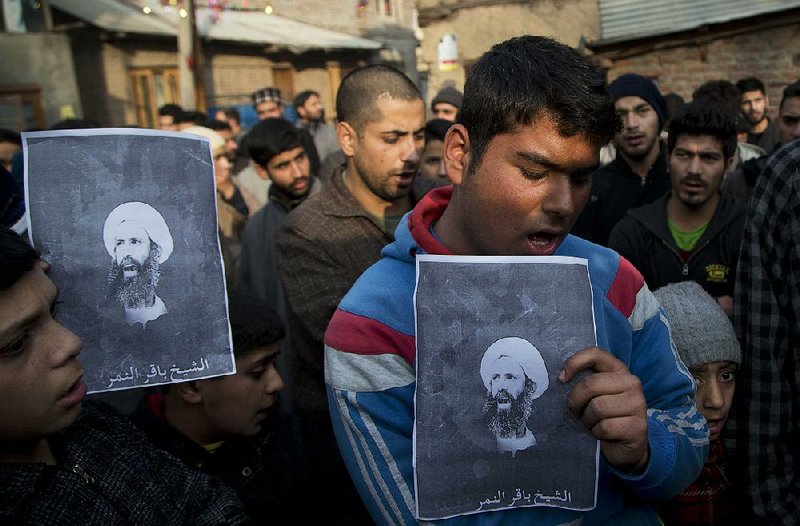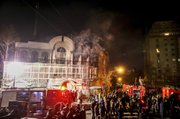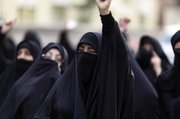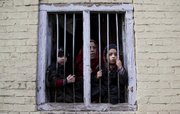RIYADH, Saudi Arabia -- Saudi Arabia's execution Saturday of 47 prisoners, including an influential Shiite cleric, drew swift condemnation from leaders across the Shiite world, and sparked angry protests in Iran.
Demonstrations sprang up in several Iranian cities, including Tehran, where protesters broke into the Saudi Embassy, ransacked it and set at least one room ablaze. Demonstrators also torched the Saudi Consulate in the city of Mashhad.
In Tehran, protesters enraged over the execution of Sheikh Nimr al-Nimr broke furniture and smashed windows in the embassy, said a witness who was reached by telephone. The mob also gathered up papers from the embassy and threw them from the roof, said the witness, who would provide only his first name, Abolfazl, because he had been involved in the protest.
Iran's semiofficial ISNA news agency said the country's top police official, Gen. Hossein Sajedinia, had rushed to the scene, and police were working to disperse the crowd early today.
People had gathered outside the embassy and chanted anti-Saudi slogans. Some protesters threw stones and Molotov cocktails at the embassy, setting off a fire in part of the building, Sajedinia said.
"Some of them entered the embassy. Currently, individuals who entered the embassy have been transferred out [of the building]. However, a large crowd is still there in front of the embassy," Sajedinia told ISNA early today.
Shiite leaders warned of a sectarian backlash as Saudi Arabia insisted that the executions were part of a justified war on terrorism. Also executed Saturday were al-Qaida detainees who were convicted of launching attacks against foreigners and security forces a decade ago.
Al-Nimr, 56, was a key figure in the protests among Saudi Arabia's Shiite minority in 2011, inspired by the Arab Spring revolts elsewhere in the region.
Iranian politicians warned that the Saudi monarchy would pay a heavy price for the death of al-Nimr. The Iranian Foreign Ministry summoned the Saudi envoy in Tehran to protest, and parliament speaker Ali Larijani said the execution would prompt "a maelstrom" in Saudi Arabia.
The Saudi Foreign Ministry later said it had summoned Iran's envoy to the kingdom to protest the critical Iranian reaction to the sheikh's execution, saying it represented "blatant interference" in Saudi internal affairs.
The ministry also said it held Iran responsible for protecting the Saudi Embassy in Tehran, the Saudi Consulate in Mashhad and their employees, the state-run Saudi Press Agency reported, citing an unnamed Foreign Ministry official.
Iraqi Prime Minister Haidar al-Aabadi tweeted on Saturday that he was "shocked and saddened" by al-Nimr's execution, adding that "peaceful opposition is a fundamental right. Repression does not last."
The influential Shiite cleric Muqtada al-Sadr told Iraqis to take their demonstrations to the newly reopened Saudi Embassy in Baghdad's fortified Green Zone, which welcomed a new Saudi ambassador to Iraq on Friday for the first time in nearly 25 years.
Hundreds of al-Nimr's supporters protested in his hometown of al-Qatif in eastern Saudi Arabia; in neighboring Bahrain, where police fired tear gas and birdshot; and as far away as northern India.
Executions condemned
Germany's Foreign Ministry said the cleric's execution "strengthens our existing concerns about the growing tensions and the deepening rifts in the region."
U.S. State Department spokesman John Kirby said in a statement that the U.S. is "particularly concerned" that al-Nimr's execution risked "exacerbating sectarian tensions at a time when they urgently need to be reduced." He said the U.S. is calling on Saudi Arabia to ensure fair judicial proceedings and permit peaceful expression of dissent.
A spokesman said in a statement that United Nations Secretary-General Ban Ki-moon was "deeply dismayed" over the Saudi Arabia executions, including that of al-Nimr.
Al-Nimr's death comes 11 months after Saudi Arabia issued a counterterrorism law in the wake of Arab Spring protests that shook the region in 2011. The law codified that the kingdom could prosecute as a terrorist anyone who demands change, exposes corruption, or otherwise engages in dissent or violence against the government.
A Saudi lawyer in the eastern region said three other Shiite political detainees were also executed from among the 47. The lawyer spoke on condition of anonymity for fear of reprisal.
Advocacy organization Reprieve, which works against the death penalty worldwide, said two of the Shiites executed were teenagers when they were arrested. Reprieve said Ali al-Ribh was 18 years old and Mohammed al-Shuyokh was 19 at the time of their arrests in 2012. Both were convicted on charges related to anti-government protests held in eastern Saudi Arabia.
Saudi Arabia said all of those executed were convicted of acts of terrorism. Al-Nimr and the three others mentioned were charged in violence that led to the deaths of several protesters and police officers.
Saudi Arabia's top cleric, Grand Mufti Sheikh Abdulaziz Al Sheikh, defended the executions as in line with Islamic Shariah law. He described the executions as a "mercy to the prisoners" because it would save them from committing more evil acts.
Because Saudi Arabia carries out most executions through beheading and sometimes in public, it has drawn comparisons to extremist groups like al-Qaida and the Islamic State, which also carry out public beheadings and claim to be implementing Shariah law.
Saudi Arabia strongly rejects the comparisons and points out that it has a judicial appeals process with executions ultimately aimed at combating crime. In a news conference Saturday, Saudi Interior Ministry spokesman Maj. Gen. Mansour al-Turki said the executions were carried out inside prisons and not in public.
Human-rights groups have criticized the Saudi justice system for not following due process by denying the accused access to legal counsel during interrogations and indicting suspects on vague charges like adopting extremist ideology or undermining the stability of the state.
In Lebanon, senior Shiite cleric Abdul-Amir Kabalan described al-Nimr's execution as "a grave mistake that could have been avoided with a royal amnesty."
The Lebanese Shiite militant group Hezbollah issued a statement calling al-Nimr's execution an "assassination" and an "ugly crime." The group added that those who carry the "moral and direct responsibility for this crime are the United States and its allies who give direct protection to the Saudi regime."
The execution of al-Qaida militants raised concerns over revenge attacks. The extremist group's branch in Yemen, known as al-Qaida in the Arabian Peninsula, had threatened violence against Saudi security forces last month if they carried out executions of its fighters.
One of the executed was Faris al-Shuwail, a leader in al-Qaida's Saudi branch who was arrested in August 2004.
The executions took place in the capital, Riyadh, and 12 other cities and towns. Of those executed, 45 were Saudis, one was from Chad and another was from Egypt.
Family reacts
The sheikh's brother, Mohammed al-Nimr, said in a telephone interview that Saudi authorities told the family that they had already buried the body but didn't tell them at which cemetery. The family had hoped to bury his body in his hometown. Instead the family planned to hold prayers and accept condolences at the mosque in a village near al-Qatif.
Mohammed al-Nimr pledged on his Twitter account that the pro-democracy movement among Saudi Shiites will continue.
"Wrong, misled and mistaken [are] those who think that the killing will keep us from our rightful demands," he tweeted after the execution was announced.
Al-Nimr never denied the political charges against him but maintained that he never carried weapons or called for violence.
At his trial, he was asked if he disapproved of the Al Saud ruling family because of speeches in which he spoke out forcefully against former Interior Minister and late Crown Prince Nayef bin Abdelaziz, who was King Salman's elder brother.
"If injustice stops against Shiites in the east, then [at that point] I can have a different opinion," the cleric responded, according Mohammed al-Nimr, who attended court sessions and spoke to The Associated Press just days before the Oct. 2014 verdict.
Al-Nimr's brother said by telephone that the executions came as a "big shock" because "we thought the authorities could adopt a political approach to settle matters without bloodshed." He urged people to "adopt peaceful means when expressing their anger."
Mohammed's son Ali, the cleric's nephew, is facing execution by crucifixion, but his name was not among those listed Saturday. He was 17 years old in February 2012 when he was arrested. He was later convicted, and his death sentence upheld, on charges of attacking security forces and taking part in protests, among other charges.
Saudi Arabia carried out at least 157 executions in 2015, with beheadings reaching their highest level in the kingdom in two decades, according to human-rights groups.
Information for this article was contributed by Abdullah al-Shihri, Aya Batrawy, Jon Gambrell, Maamoun Youssef, Reem Khalifa, Ali Akbar Dareini, Sinan Salaheddin and Bassem Mroue of The Associated Press; by Liz Sly, Mustafa Salim and Brian Murphy of The Washington Post; and by Ben Hubbard, Thomas Erdbrink and Kareem Fahim of The New York Times.
A Section on 01/03/2016



